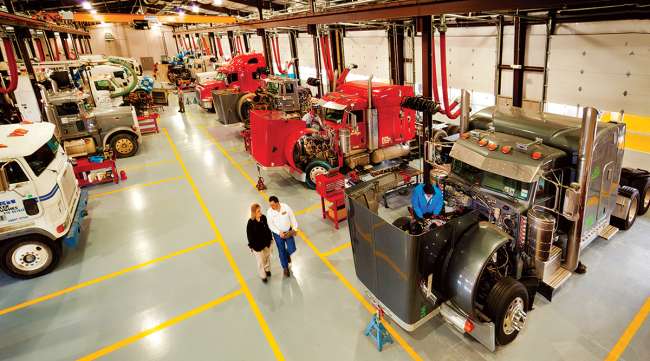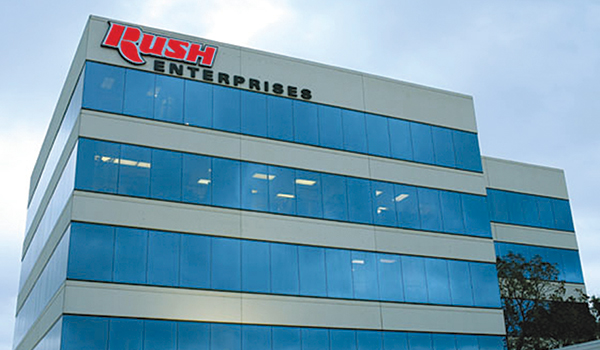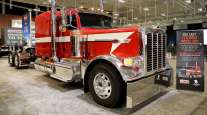Senior Reporter
Rush Reports Declines in Q2 Profit, Revenue

[Stay on top of transportation news: Get TTNews in your inbox.]
Truck dealership Rush Enterprises reported declines in second-quarter net income and revenue as all segments of its business were hurt by the economic effects of the COVID-19 pandemic.
For the period ended June 30, the company reported net income of $16.8 million, or 46 cents per diluted share, compared with $41.6 million, or $1.10, in the year-earlier quarter.
Revenue dropped to $1 billion compared with $1.5 billion a year earlier.

Rush
“As expected, the COVID-19 pandemic and resulting shutdown orders that forced many businesses to close, combined with the previously expected industry downturn in new commercial vehicle sales, and the unexpected energy price war and precipitous drop in oil prices, had a significant negative impact on our financial results in the second quarter,” said W.M. “Rusty” Rush, chairman and CEO of Rush Enterprises Inc.
The San Antonio-based company sold 1,866 new Class 8 trucks in the second quarter, a decrease of 54.7% compared with the 2019 period. It accounted for 5.2% of the new U.S. Class 8 market — down from 5.7% a year earlier — based on ACT Research’s total of 36,042.
Rush said ACT forecasts U.S. Class 8 retail sales will hit 159,000, up from 127,500 in its first-quarter forecast.
In Classes 4-7, Rush sold 2,333 units, down 39.7% over the same period last year. That accounted for 4.6% of that market.

Rush increased its mimimum wage for hourly workers to $15. It also renewed its stock repurchase program and lifted the wage freeze for service technicians implemented during the quarter. (Rush Enterprises Inc.)
It sold 1,768 used commercial trucks in the period, a decrease of 15.8% compared with a year earlier.
Aftermarket products and services revenue sank to $377.6 million compared to $448.2 million.
The company’s absorption ratio declined to 110.2% compared with 122.4% a year earlier.
Rush calculates absorption ratio by dividing the gross profit from the parts, service and body shop departments by the overhead expenses of all of a dealership’s departments, except for the selling expenses of the new and used commercial vehicle departments and carrying costs of new and used commercial vehicle inventory.
“To address the challenging market conditions, we expeditiously implemented steps to appropriately reduce and manage expenses in order to maintain profitability,” he said. “Based on current market conditions, we believe the worst is behind us. We will continue to carefully monitor the pandemic and its impact on our customers and the general economy. We believe any recovery will be gradual and intermittent over the next few quarters.”

5G wireless networks promise greater bandwidth, faster speeds and improved reliability. But how long will the industry have to wait until this technology is ready for fleet operations? Host Seth Clevenger talks with Chris Wolfe of PowerFleet and John Binder of Trimble Transportation. Hear a snippet, above, and get the full program by going to RoadSigns.TTNews.com.
Rush added: “Activity from the energy sector remains the most severely impacted. Global pricing actions have negatively affected rig counts and the number of energy vehicles in service, and this segment is not expected to improve in the near-term.”
At the same time, the company increased its quarterly cash dividend by 1 cent to 14 cents.
Classified as essential businesses, Rush Truck Centers have remained fully operational across the company’s dealership network, though some hours of operation remain modified to accommodate previous staffing reductions and frequent cleaning and sanitizing of locations. The company continues to provide curbside parts pick-up, online parts ordering and web-based vehicle service communications.
Net income for the six-month period was $39.9 million, or $1.08, compared with $78.7 million, or $2.08, a year earlier.
Six-month revenue fell to $2.3 billion compared with $2.9 billion.
In related news, the company increased to $15 the minimum wage paid to all hourly workers. It renewed its stock repurchase program and lifted the wage freeze for service technicians implemented during the quarter “in recognition of the important work they are doing to keep our customers up and running,” Rush said.
The company owns and operates Rush Truck Centers, the largest network of commercial vehicle dealerships in the United States, with more than 100 locations in 22 states. It represents truck manufacturers Peterbilt, International, Hino, Isuzu, Ford and Mitsubishi.
Want more news? Listen to today's daily briefing:
Subscribe: Apple Podcasts | Spotify | Amazon Alexa | Google Assistant | More



